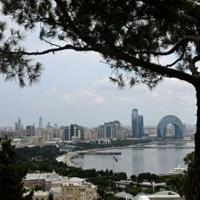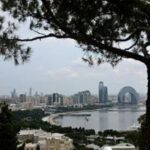Witness flames rising into the air from a sandstone outcrop on a hillside of the Absheron peninsula near Baku, the capital of Azerbaijan, as it readies to host the COP29 climate conference.
Known as the “burning mountain” in Azerbaijani, Yanardag is fueled by underground gas that emerges to the surface and ignites upon meeting oxygen.
This abundance of natural fires from the country’s substantial gas reserves has led to it being nicknamed “The Land of Fire.”
The energy-rich nation of Azerbaijan has been significantly influenced by its vast oil and gas resources, shaping its history, culture, politics, and economy, according to energy expert Kamalya Mustafayeva.
Discovering oil deposits of 7 billion barrels in the mid-19th century, Azerbaijan, then part of the Russian Empire, was among the first locations in the world to embark on commercial oil production.
“Azerbaijan drilled the world’s first industrial onshore oil well, as well as the first offshore one,” stated Ashraf Shikhaliyev, director of the energy ministry’s international cooperation department, to AFP.
– ‘Birthed from oil boom’ –
Since gaining independence from the Soviet Union in 1991, Azerbaijan has produced 1.05 billion tonnes of oil and aims to boost its natural gas production from 37 billion cubic metres (bcm) this year to 49 bcm over the next decade, according to official statistics.
The country’s GDP relies on oil and gas revenues for about 35 percent, contributing nearly half of the state budget.
“Azerbaijan’s oil revenues, amounting to $200 billion since 1991, enabled the country to make significant progress,” stated Sabit Bagirov, former head of the State Oil Company of Azerbaijan in the 1990s.
“Baku, once a small fishing village with roughly 4,000 inhabitants, was shaped by an oil boom,” which led to rapid population growth — surpassing that of London, Paris, and New York — from the 1890s, as highlighted by energy expert Ilham Shaban.
Modern Baku is now a vibrant metropolis adorned with skyscrapers, waterfront promenades, and futuristic structures designed by renowned architects.
The Azerbaijani capital has become a hub for significant international gatherings, including the 2012 Eurovision Song Contest, matches in the Euro 2020 football championship, and the Formula 1 motor racing Grand Prix.
The wealth from petrodollars aided Azerbaijan in bolstering its defenses against long-time adversary Armenia, culminating in the recapture of the breakaway Nagorno-Karabakh region last year from Armenian separatists who had held control for decades.
– ‘Europe’s energy security’ –
About 75 percent of Azerbaijan’s energy exports head to European markets.
In 2022, the European Commission signed an agreement with Baku to double gas imports from the country in a bid to reduce Europe’s reliance on Russian gas.
However, President Ilham Aliyev’s labeled “a gift of God” fossil fuel reservoirs are anticipated to be depleted within the next few decades.
Expert Shaban emphasized that “Azerbaijan’s objective is to maximize revenue from its hydrocarbon reserves before Europe attains its decarbonization goals,” which will significantly reduce demand for fossil fuels on the continent.
– Green agenda –
Azerbaijan’s ambitious energy expansion plans suggest it could produce 781 million tonnes of carbon dioxide greenhouse gas annually, exceeding twice the UK’s yearly emissions, as reported by London-based Global Witness environmental group in January.
This projection has drawn skepticism from environmentalists ahead of the COP29.
“COP hosts carry an obligation to drive progress, and the solution doesn’t lie in oil wells or gas pipelines but in ambitious climate finance and action,” expressed Jasper Inventor, Greenpeace International’s head of delegation for COP29.
Azerbaijani officials affirmed the country is making substantial strides in establishing its own green agenda.
The goal is to elevate renewable energy capacity to 30 percent by 2030 and slash greenhouse gas emissions by 40 percent by 2050.
Shikhaliyev outlined “clean energy mega projects” like transforming the recently regained Nagorno-Karabakh region into a “green energy zone” fully powered by solar, wind, and hydropower.
im/fg/mca




